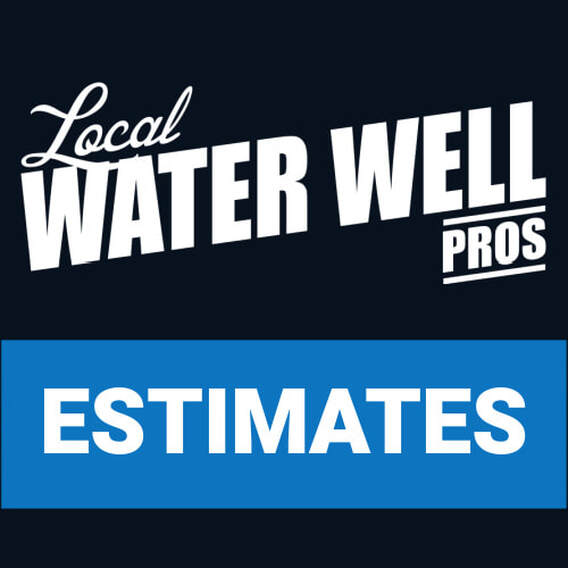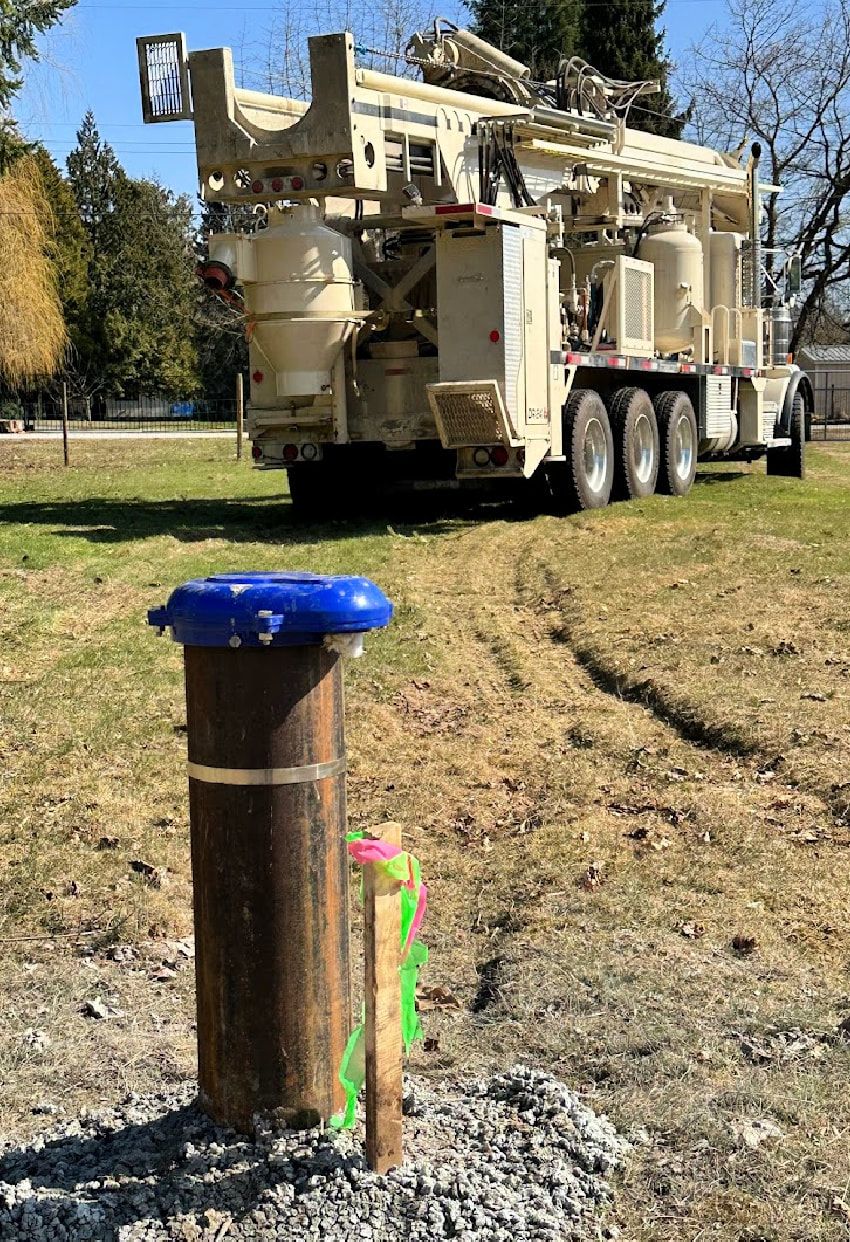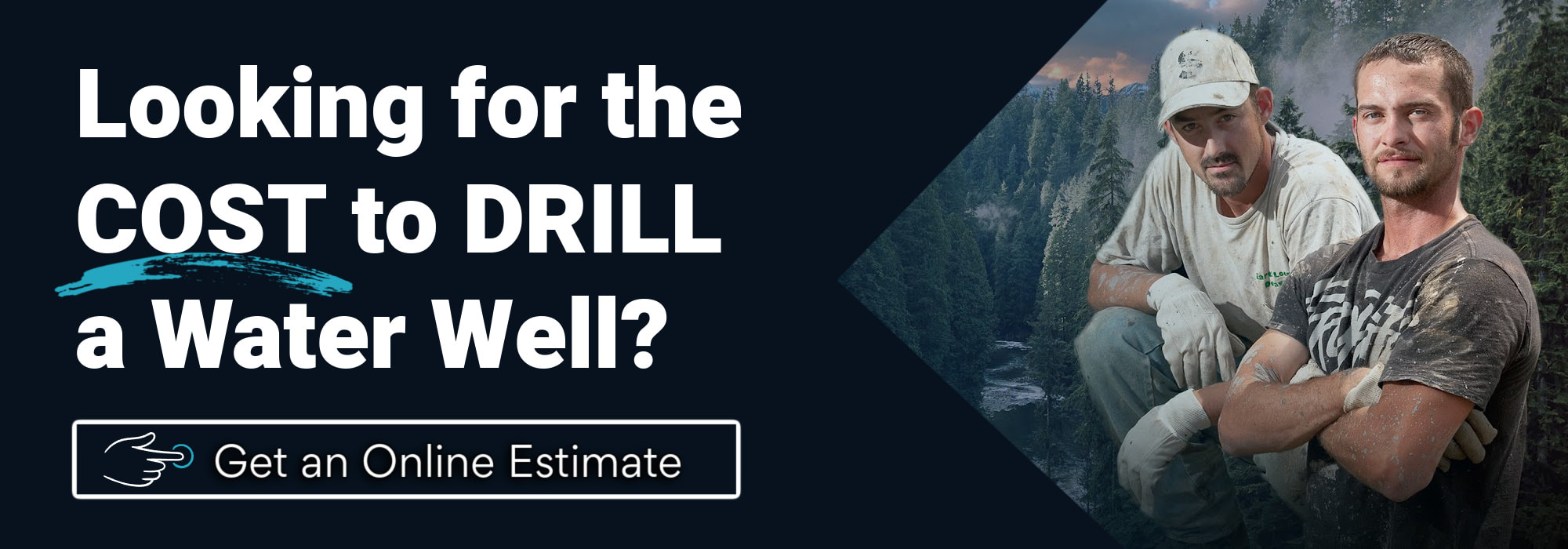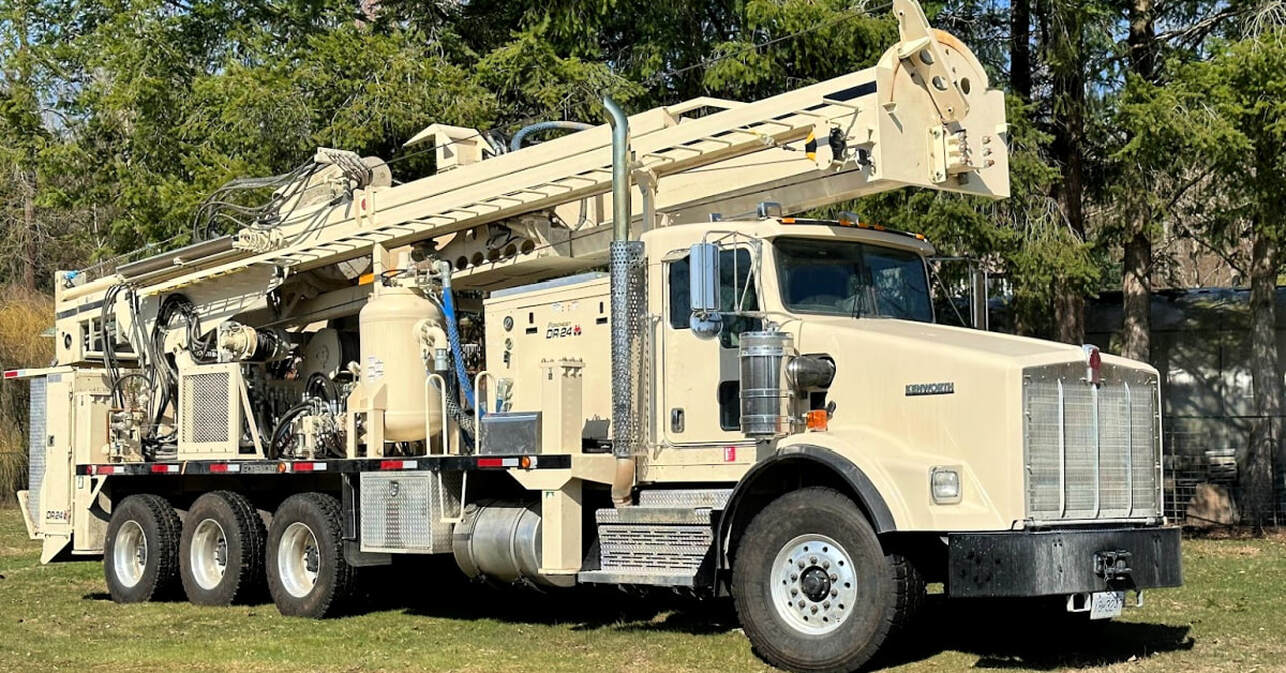CHILLIWACK
WELL DRILLING FAQ
Our Chilliwack Water Well Service Area
Agassiz | Bridal Falls | Chilliwack River Valley | Columbia Valley | Chilliwack Mountain |
Cultus Lake | Fairfield Island | Greendale | Kent | Little Mountain | Popkum |
Promontory Heights | Rosedale | Ryder Lake | Sumas Mountain | Yarrow | Sardis | Vedder Crossing | Hope
Agassiz | Bridal Falls | Chilliwack River Valley | Columbia Valley | Chilliwack Mountain |
Cultus Lake | Fairfield Island | Greendale | Kent | Little Mountain | Popkum |
Promontory Heights | Rosedale | Ryder Lake | Sumas Mountain | Yarrow | Sardis | Vedder Crossing | Hope
|
Serving Chilliwack Valley
Agassiz | Bridal Falls | Chilliwack River Valley | Columbia Valley | Chilliwack Mountain | Cultus Lake | Fairfield Island | Greendale | Kent | Little Mountain |Popkum | Promontory Heights | Rosedale | Ryder Lake | Sumas Mountain | Yarrow | Sardis | Vedder Crossing | Hope Contact Us Today!Have a question? Please give us a call or request a detailed online estimate for the cost to drill a well in the Chilliwack area.
|
Chilliwack Well Drilling FAQ
Chilliwack Well Drilling specializes in water well services, including water well drilling, water well repairs, and decommissioning. We are fully equipped to drill domestic water wells, larger-diameter water wells for agriculture, and commercial water wells. Our local well drilling service area includes Chilliwack, Bridal Falls, Chilliwack River Valley, Columbia Valley, Cultus Lake, Chilliwack Mountain, Fairfield Island, Greendale, Kent, Little Mountain, Popkum, Promontory Heights, Rosedale, Ryder Lake, Sardis, Sumas Mountain, Vedder Crossing, Yarrow, Hope & Merritt. Chilliwack Well Drilling offers outstanding water well service; and can complete all water well projects, regardless of size. Water resources throughout the Chilliwack Valley are one of the most coveted natural-resources. Accessing water in the Chilliwack aquifers requires high-precision drilling to avoid potential water well problems. We are dedicated to meeting the water well requirements of our residential, commercial, and industrial clients in the Chilliwack Valley and welcome your questions, we are here to serve you! Chilliwack Well Drilling FAQ is our local well drilling guide to details that people planning to drill a well in the Chilliwack area frequently ask. Please take a few moments to read over the following information, We hope that you find it helpful! Common Chilliwack Water Well Questions
What is the cost of drilling a well in Chilliwack?
Understanding the cost of drilling a water well in Chilliwack is crucial for local property owners, farmers, and business owners planning to secure a private water supply. The cost of drilling a water well in Chilliwack varies widely, typically from $16,000 to $32,000. This variance is due to several key factors that can affect the final cost to drill.
Please note that the Chilliwack water well drilling costs outlined above are specific to residential water well systems. Municipal, agricultural, or industrial applications will increase due to the need for a larger-scale water system. These projects typically require intricate planning, pumps with higher capacities, and comprehensive piping systems to accommodate increased water demands. |
Get a Detailed Water Well Drilling Estimate
Considering the increased water well drilling costs in Chilliwack and the Fraser Valley, the most reliable method to secure an accurate estimate for well drilling in the Chilliwack Valley is to reach out directly to Chilliwack Well Drilling Services or use our online estimating system for a fast response.
Chilliwack Well Drilling Cost Conclusion
Investing in a water well is a significant decision that requires careful consideration, and Site Selection. Understanding the different aspects of water well drilling will help you create a more accurate estimate of your project's total costs. Our well-drilling estimator can provide detailed information tailored to your specific needs and the unique characteristics of your property.
Considering the increased water well drilling costs in Chilliwack and the Fraser Valley, the most reliable method to secure an accurate estimate for well drilling in the Chilliwack Valley is to reach out directly to Chilliwack Well Drilling Services or use our online estimating system for a fast response.
Chilliwack Well Drilling Cost Conclusion
Investing in a water well is a significant decision that requires careful consideration, and Site Selection. Understanding the different aspects of water well drilling will help you create a more accurate estimate of your project's total costs. Our well-drilling estimator can provide detailed information tailored to your specific needs and the unique characteristics of your property.
Water Well FAQ: Are permits required in Chilliwack?
A provincial permit to drill a domestic water well in the Chilliwack Valley is not required.
Water Well FAQ: How long does it take to drill a water well?
Most water wells drilled in the Chilliwack region are completed within a day or two once the drilling equipment is setup. Chilliwack Well Drilling drills year-round, but the property needs to be dry enough to be accessed with a well drilling rig.
Winter can be a great time to drill for water, and the waiting period is usually reduced considerably if the property is accessible during the wet months.
As we proceed into summer, the water well drilling rigs book-up quickly, leading to longer waiting periods to drill for water in Chilliwack.
Water Well FAQ: Where should I drill my water well
How do we determine the best location to drill a well on your Chilliwack property?
At Chilliwack Well Drilling, we prioritize identifying the most suitable site for your new water well. We visit all properties to assess and select the ideal drilling location, ensuring we maximize the potential for a successful well.
Understanding that each property is unique, we encourage you to contact our office for specialized advice on well drilling in your area. Unlike some drillers who might select drilling sites arbitrarily or often leave the decision to the property owner, a risky approach that can be hit-or-miss, we at Chilliwack Well Drilling recognize the potential pitfalls of random drilling.
In certain regions, especially within some areas of the Fraser Valley, random drilling could lead to a high incidence of unsuccessful dry wells or wells with insufficient water yield.
Chilliwack Water Well Setback Regulations
Water wells drilled in British Columbia should not be:
1) Within a horizontal distance of 3 m (10 feet) of an existing building
2) Within a horizontal distance of 30 m (100 feet) of any probable source of contamination or point of waste discharge to the ground, such as a privy vault, cesspool, septic effluent field, manure heap, stable or pig sty;
3) Or within a horizontal distance of 120 m (400 feet) of any cemetery or dumping ground
Not all drilled wells in Chilliwack are deep, many of the drilled wells are far less than 200' deep. If a well is drilled near a possible source of contamination it may be vulnerable and become contaminated.
Chilliwack Water Well Regulations - Ministry of Environment set-backs for water wells through-out the Fraser Valley communities are required to protect our valuable water resources from contamination from a multitude of possibilities.
To understand local comparable well drilling depths in the area, it's best to refer to the well drilling reports for Chilliwack on the BC Wells Database or contact our office and we are happy to help you with the local water well drilling information.
Possible sources of contamination include waste discharging to the ground, such as privy vaults (also known as out-house or pit-toilets), cesspools (“over-flow” pits), septic tanks and effluent fields, stable or pig sty, manure-heaps, fertilizers and pesticides, under ground storage tanks, run off from urban areas, cemeteries or landfill sites etc.
Water Wells should be constructed on higher-ground to protect a well head from normal or seasonal flooding and possible surface drainage contamination.
A provincial permit to drill a domestic water well in the Chilliwack Valley is not required.
Water Well FAQ: How long does it take to drill a water well?
Most water wells drilled in the Chilliwack region are completed within a day or two once the drilling equipment is setup. Chilliwack Well Drilling drills year-round, but the property needs to be dry enough to be accessed with a well drilling rig.
Winter can be a great time to drill for water, and the waiting period is usually reduced considerably if the property is accessible during the wet months.
As we proceed into summer, the water well drilling rigs book-up quickly, leading to longer waiting periods to drill for water in Chilliwack.
Water Well FAQ: Where should I drill my water well
How do we determine the best location to drill a well on your Chilliwack property?
At Chilliwack Well Drilling, we prioritize identifying the most suitable site for your new water well. We visit all properties to assess and select the ideal drilling location, ensuring we maximize the potential for a successful well.
Understanding that each property is unique, we encourage you to contact our office for specialized advice on well drilling in your area. Unlike some drillers who might select drilling sites arbitrarily or often leave the decision to the property owner, a risky approach that can be hit-or-miss, we at Chilliwack Well Drilling recognize the potential pitfalls of random drilling.
In certain regions, especially within some areas of the Fraser Valley, random drilling could lead to a high incidence of unsuccessful dry wells or wells with insufficient water yield.
Chilliwack Water Well Setback Regulations
Water wells drilled in British Columbia should not be:
1) Within a horizontal distance of 3 m (10 feet) of an existing building
2) Within a horizontal distance of 30 m (100 feet) of any probable source of contamination or point of waste discharge to the ground, such as a privy vault, cesspool, septic effluent field, manure heap, stable or pig sty;
3) Or within a horizontal distance of 120 m (400 feet) of any cemetery or dumping ground
Not all drilled wells in Chilliwack are deep, many of the drilled wells are far less than 200' deep. If a well is drilled near a possible source of contamination it may be vulnerable and become contaminated.
Chilliwack Water Well Regulations - Ministry of Environment set-backs for water wells through-out the Fraser Valley communities are required to protect our valuable water resources from contamination from a multitude of possibilities.
To understand local comparable well drilling depths in the area, it's best to refer to the well drilling reports for Chilliwack on the BC Wells Database or contact our office and we are happy to help you with the local water well drilling information.
Possible sources of contamination include waste discharging to the ground, such as privy vaults (also known as out-house or pit-toilets), cesspools (“over-flow” pits), septic tanks and effluent fields, stable or pig sty, manure-heaps, fertilizers and pesticides, under ground storage tanks, run off from urban areas, cemeteries or landfill sites etc.
Water Wells should be constructed on higher-ground to protect a well head from normal or seasonal flooding and possible surface drainage contamination.
Chilliwack Well Drilling FAQ: How deep will my drilled well be?
The average depth of a drilled well in Chilliwack is between 60 - 250'. However, well depth cannot always be precisely determined prior to drilling. The depth of local water wells will differ from one property to another. We carefully research an area prior to writing a quote for the cost of drilling a well in Chilliwack.
Chilliwack Well Drilling FAQ: Is there a guarantee that we will have water?
There's never a guarantee of hitting water when drilling a water well, however, when drilling into a Chilliwack aquifer, most wells are successful. The amount of water that a well will yield is highly-variable and not determined prior to drilling for water.
Well drilling is a significant investment for most property owners, and we do all that we can prior to drilling to protect our clients from unexpected well drilling difficulties. We do not support the practice of deep-holing when drilling in the Upper Fraser Valley and work in the best interest of our local clients.
Chilliwack Well Drilling FAQ: How much water should I expect from a well?
Wells in Chilliwack and neighboring communities typically produce from 2 to100 gallons per minute. Sometimes yields as high as 300-gallons per minute or more have been achieved with larger-diameter domestic wells. Approximately 5 to 15 % of the water wells drilled in the Chilliwack Valley may even produce less than two-gallons per minute.
As with depth, the amount of water that a drilled water well in Chilliwack will yield is highly variable and likely will not be determined prior to the completion of drilling. With correct research and extensive local water well experience, we can often provide information with our well drilling cost estimate about possible yields from water wells near your Chilliwack property.
The average depth of a drilled well in Chilliwack is between 60 - 250'. However, well depth cannot always be precisely determined prior to drilling. The depth of local water wells will differ from one property to another. We carefully research an area prior to writing a quote for the cost of drilling a well in Chilliwack.
Chilliwack Well Drilling FAQ: Is there a guarantee that we will have water?
There's never a guarantee of hitting water when drilling a water well, however, when drilling into a Chilliwack aquifer, most wells are successful. The amount of water that a well will yield is highly-variable and not determined prior to drilling for water.
Well drilling is a significant investment for most property owners, and we do all that we can prior to drilling to protect our clients from unexpected well drilling difficulties. We do not support the practice of deep-holing when drilling in the Upper Fraser Valley and work in the best interest of our local clients.
Chilliwack Well Drilling FAQ: How much water should I expect from a well?
Wells in Chilliwack and neighboring communities typically produce from 2 to100 gallons per minute. Sometimes yields as high as 300-gallons per minute or more have been achieved with larger-diameter domestic wells. Approximately 5 to 15 % of the water wells drilled in the Chilliwack Valley may even produce less than two-gallons per minute.
As with depth, the amount of water that a drilled water well in Chilliwack will yield is highly variable and likely will not be determined prior to the completion of drilling. With correct research and extensive local water well experience, we can often provide information with our well drilling cost estimate about possible yields from water wells near your Chilliwack property.
Water Well FAQ: What should I expect for water quality?
Once the drilling of a new water well has been completed, here's what you should know about water quality and the steps to ensure it's suitable for use on your Chilliwack property.
Understanding Water Quality in Chilliwack's Water Wells:
Once the drilling of a new water well has been completed, here's what you should know about water quality and the steps to ensure it's suitable for use on your Chilliwack property.
Understanding Water Quality in Chilliwack's Water Wells:
- Mineral Content: Expect different levels of calcium, magnesium, iron, and manganese-based on the area's geological characteristics.
- Surface Contamination: Proximity to farms, industrial sites, or residential zones could pose risks of pesticides, nitrates, and chemical infiltration into your well.
- Natural Contaminants: Some regions may have elevated arsenic or fluoride levels; these tend to fluctuate over short distances.
- Microbial Contamination: Be mindful of testing your well water for bacteria, viruses, and parasites, especially post-heavy rain or floods in Chilliwack and the Fraser Valley. Ensuring professional water well construction that meets British Columbia groundwater protection regulations and water well maintenance is essential.
- Well Development: Once the drilling is complete, the well driller begins developing the well, which could be described as the cleanup stage. The purpose of water well development is to increase water yeild into the well and to ensure the water is clean enough not to damage a well pump once installed. Many property owners need to understand the importance of water well development. Once the well development begins, you might see the water quality cleanup quickly, or it could take several hours or sometimes even longer.
- Water Testing: Water quality testing ensures that the water from the well is safe for drinking and other uses by checking for contaminants, such as bacteria, chemicals, and minerals, that could harm health. Water samples need to go to an accredited laboratory serving the Fraser Valley. Here is a list of the certified water testing laboratories.
- Water Treatment Systems: Depending on lab results, installing specific home water treatment systems (water softeners, reverse osmosis systems, UV filters) may be necessary to treat water quality issues. Modern water treatment technologies are very effective if properly designed and installed if required.
- Regular Well Water Monitoring: Ongoing water testing and maintenance are crucial for long-term water safety.
- Also Consult With Chilliwack Water Well Experts: For additional advice, please contact Chilliwack Well Drilling Services or reach out to a local hydrogeologist or other water quality specialists who can provide insights to meet your specific water well needs in Chilliwack.
More About Water Wells in the Chilliwack Valley
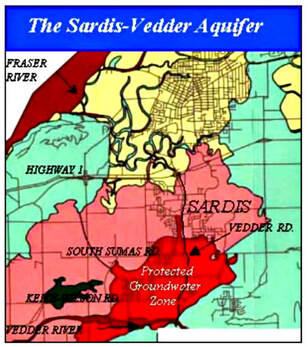
Where is the Sardis Vedder Aquifer located?
The Sardis Vedder Aquifer is located immediately north of the Vedder River in Sardis and extends north to the No. 1 Highway. It's bound on the west side of the aquifer by Abbotsford's city border and on the east side of the aquifer by Prest Road in Chilliwack
The location of the Sardis Vedder Aquifer is shown in the diagram. The vulnerable areas is indicated by the colour coding, with red being the most vulnerable area, followed by the pink area, and then the green area.
Sardis Vedder Aquifer is a Vital Resource for Chilliwack
Fresh groundwater is becoming a scarce resource throughout the world. One main reason for this scarcity is the inflow of chemicals and biological agents into an aquifer, which adversely affects the quality of water.
The detrimental factors are derived from man-produced points and diffuse sources. The main causes of contamination concern are harmful chemical-compounds such as salts of heavy metals, organic substances, along with possible disease causing bacteria and viruses.
These materials, generally referred to as "contaminants" or "pollutants," can persist and remain present in sub-surface waters even after passing through natural-filters like calcareous vadose (unsaturated) zones.
Clean & safe groundwater in Chilliwack is a valuable resource and is fundamental to our everyday lives and our economic well being. Ultimately, survival depends on our protection of our aquifers. The water-supply for the Chilliwack District is received from the Sardis Vedder Aquifer.
Where the Chilliwack River leaves the Cascade Mountains, a sizable alluvial fan is what makes up the Sardis Vedder Aquifer.
Because of the permeable nature of the soils overlaying the Sardis Vedder Aquifer, contaminant migration into this groundwater resource is a concern. If an aquifer does become polluted, recovery is typically very difficult—even impossible—to restore the aquifer to it's natural state, depending on its severity.
If aquifer pollution is "severe," it may be technically impossible to restore an aquifer to sound conditions. For example, cleaning sites where water contains insoluble constituents, such as jet- fuel, may require thousands of years.
Agricultural activities have been implicated as a primary cause of elevated nitrate concentrations in Fraser Valley groundwater resources. In addition to animal manures, the application of chemical fertilizers and pesticides by the agricultural industry can represent a significant threat to groundwater quality.
Septic-systems are another common source of groundwater pollution, contributing bacteria, viruses, nitrates, detergents, oils, and chemicals to the groundwater. Groundwater contamination from septic-systems results in situations where septic-systems are poorly sited, designed, or constructed, where septic systems are poorly maintained, or where septic-system densities are too high for capacity.
One of Chilliwack's greater interests is the safety of drinking water and the protection of the Sardis Vedder Aquifer. We can all protect the local aquifer by taking the correct measures to prevent chemical and waste spills, ensuring that all hazardous-materials are transported, stored, and disposed of correctly, and by working with our neighbours to minimize dangerous land use activities that may pose a risk to our groundwater resources.
How could the Sardis Vedder Aquifer become contaminated?
Aquifers are composed of permeable layers of rock, sand, or gravel that enable surface waters, including streams, rivers, and precipitation, to percolate into the ground and recharge groundwater resources.
The Sardis Vedder Aquifer is particularly vulnerable to pollution for several reasons. First, the upper-layer (sub-surface) of groundwater, the water-table, lies only a shallow five to ten meters below the ground’s surface. This is important, as chemicals or waste-materials must travel only a short distance through the soil to impact the groundwater quality.
Secondly, the boundary layer of soil that protects the groundwater from the upper-surface is coarse grained and consequently extremely permeable. Rainfall rapidly seeps through the pores of the coarse soil, carrying pollutants from the surface to the aquifer below.
The upper Fraser Valley receives abundant rainfall, particularly during the winter months, Preventing the entrance of contaminants due to surface-spills is vital to the protection of the Sardis Vedder aquifer.
Chilliwack Well Pump FAQ: What type of water well pump do I need for my well?
We will need your Chilliwack water well information before a well pump system can be accurately sized and designed. The type and size of a well pump are decided by the depth and flow-rate of a water well. The design of the water pumping system will also determine the required pressure-system and other variables.
Typically, with a drilled well, a submersible-pump and motors will be installed approximately 10' from the bottom of the well.
Chilliwack Well Drilling also has a team of well pump experts. Well pump professionals are not to be confused with well drillers, we do focus on offering complete water systems to our clients. Our Chilliwack Well Pump experts will design the best water pumping system to fit your water requirements.
Many Chilliwack area property owners prefer our full service water system program,. We can manage well drilling projects from domestic water wells to large diameter systems. We handle well pump installations and complete water systems from scratch, regardless of size.
Our complete water system service eliminates stressful and costly problems often experienced by using multiple contractors who often do not communicate with each other or are not willing to work together for the sole-benefit of a local property owner.
Chilliwack Well Pump maintains affordable water well services. Call to learn more about our water well services! Request an online quote for our Chilliwack well pump costs and repairs.
The Sardis Vedder Aquifer is located immediately north of the Vedder River in Sardis and extends north to the No. 1 Highway. It's bound on the west side of the aquifer by Abbotsford's city border and on the east side of the aquifer by Prest Road in Chilliwack
The location of the Sardis Vedder Aquifer is shown in the diagram. The vulnerable areas is indicated by the colour coding, with red being the most vulnerable area, followed by the pink area, and then the green area.
Sardis Vedder Aquifer is a Vital Resource for Chilliwack
Fresh groundwater is becoming a scarce resource throughout the world. One main reason for this scarcity is the inflow of chemicals and biological agents into an aquifer, which adversely affects the quality of water.
The detrimental factors are derived from man-produced points and diffuse sources. The main causes of contamination concern are harmful chemical-compounds such as salts of heavy metals, organic substances, along with possible disease causing bacteria and viruses.
These materials, generally referred to as "contaminants" or "pollutants," can persist and remain present in sub-surface waters even after passing through natural-filters like calcareous vadose (unsaturated) zones.
Clean & safe groundwater in Chilliwack is a valuable resource and is fundamental to our everyday lives and our economic well being. Ultimately, survival depends on our protection of our aquifers. The water-supply for the Chilliwack District is received from the Sardis Vedder Aquifer.
Where the Chilliwack River leaves the Cascade Mountains, a sizable alluvial fan is what makes up the Sardis Vedder Aquifer.
Because of the permeable nature of the soils overlaying the Sardis Vedder Aquifer, contaminant migration into this groundwater resource is a concern. If an aquifer does become polluted, recovery is typically very difficult—even impossible—to restore the aquifer to it's natural state, depending on its severity.
If aquifer pollution is "severe," it may be technically impossible to restore an aquifer to sound conditions. For example, cleaning sites where water contains insoluble constituents, such as jet- fuel, may require thousands of years.
Agricultural activities have been implicated as a primary cause of elevated nitrate concentrations in Fraser Valley groundwater resources. In addition to animal manures, the application of chemical fertilizers and pesticides by the agricultural industry can represent a significant threat to groundwater quality.
Septic-systems are another common source of groundwater pollution, contributing bacteria, viruses, nitrates, detergents, oils, and chemicals to the groundwater. Groundwater contamination from septic-systems results in situations where septic-systems are poorly sited, designed, or constructed, where septic systems are poorly maintained, or where septic-system densities are too high for capacity.
One of Chilliwack's greater interests is the safety of drinking water and the protection of the Sardis Vedder Aquifer. We can all protect the local aquifer by taking the correct measures to prevent chemical and waste spills, ensuring that all hazardous-materials are transported, stored, and disposed of correctly, and by working with our neighbours to minimize dangerous land use activities that may pose a risk to our groundwater resources.
How could the Sardis Vedder Aquifer become contaminated?
Aquifers are composed of permeable layers of rock, sand, or gravel that enable surface waters, including streams, rivers, and precipitation, to percolate into the ground and recharge groundwater resources.
The Sardis Vedder Aquifer is particularly vulnerable to pollution for several reasons. First, the upper-layer (sub-surface) of groundwater, the water-table, lies only a shallow five to ten meters below the ground’s surface. This is important, as chemicals or waste-materials must travel only a short distance through the soil to impact the groundwater quality.
Secondly, the boundary layer of soil that protects the groundwater from the upper-surface is coarse grained and consequently extremely permeable. Rainfall rapidly seeps through the pores of the coarse soil, carrying pollutants from the surface to the aquifer below.
The upper Fraser Valley receives abundant rainfall, particularly during the winter months, Preventing the entrance of contaminants due to surface-spills is vital to the protection of the Sardis Vedder aquifer.
Chilliwack Well Pump FAQ: What type of water well pump do I need for my well?
We will need your Chilliwack water well information before a well pump system can be accurately sized and designed. The type and size of a well pump are decided by the depth and flow-rate of a water well. The design of the water pumping system will also determine the required pressure-system and other variables.
Typically, with a drilled well, a submersible-pump and motors will be installed approximately 10' from the bottom of the well.
Chilliwack Well Drilling also has a team of well pump experts. Well pump professionals are not to be confused with well drillers, we do focus on offering complete water systems to our clients. Our Chilliwack Well Pump experts will design the best water pumping system to fit your water requirements.
Many Chilliwack area property owners prefer our full service water system program,. We can manage well drilling projects from domestic water wells to large diameter systems. We handle well pump installations and complete water systems from scratch, regardless of size.
Our complete water system service eliminates stressful and costly problems often experienced by using multiple contractors who often do not communicate with each other or are not willing to work together for the sole-benefit of a local property owner.
Chilliwack Well Pump maintains affordable water well services. Call to learn more about our water well services! Request an online quote for our Chilliwack well pump costs and repairs.
Chilliwack Well Pump & Repair Service
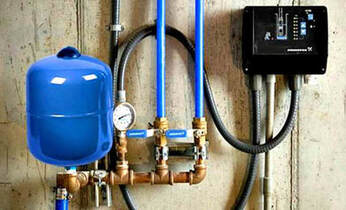
Chilliwack Well Pump & Well Pump Repair services the entire Upper Fraser Valley including Upper Fraser Valley including Chilliwack, Bridal Falls, Chilliwack River Valley, Columbia Valley, Cultus Lake, Chilliwack Mountain, Fairfield Island, Greendale, Kent, Little Mountain, Popkum, Promontory Heights, Rosedale, Ryder Lake, Sardis, Sumas Mountain, Vedder Crossing, Yarrow, Hope & Merritt.
If dealing with an aging well pump system and experiencing well pump concerns, it could be time to consider a well pump replacement. The best time to replace an existing well pump is prior to it becoming a well pump emergency.
Don't wait for your water pump to become an expensive well pump repair in Chilliwack. When well pumps quit pumping water it's not only costly but generally untimely and even more so if it's on a holiday or week-end!
Chilliwack Water Well Services
We specialize in designing all types of water pumping systems including, submersible well pumps for Chilliwack wells of all depths, shallow well systems, booster pumps, jet pumps, irrigation pumps, sump pumps, sewage pumps, pressure tanks and, pressure switch replacement. We will sort out low water pressure issues, storage tanks, water cisterns, water filtration systems and rain water systems.
Chilliwack Water Well Services includes water-line repair or recovery, pressure tanks and more. If your well suddenly goes dry, give us a call for advice. We are here to serve the water well needs of the Chilliwack families and businesses.
Chilliwack Well Pump & Water Well Repairs
Call: 778-860-4220
If dealing with an aging well pump system and experiencing well pump concerns, it could be time to consider a well pump replacement. The best time to replace an existing well pump is prior to it becoming a well pump emergency.
Don't wait for your water pump to become an expensive well pump repair in Chilliwack. When well pumps quit pumping water it's not only costly but generally untimely and even more so if it's on a holiday or week-end!
Chilliwack Water Well Services
We specialize in designing all types of water pumping systems including, submersible well pumps for Chilliwack wells of all depths, shallow well systems, booster pumps, jet pumps, irrigation pumps, sump pumps, sewage pumps, pressure tanks and, pressure switch replacement. We will sort out low water pressure issues, storage tanks, water cisterns, water filtration systems and rain water systems.
Chilliwack Water Well Services includes water-line repair or recovery, pressure tanks and more. If your well suddenly goes dry, give us a call for advice. We are here to serve the water well needs of the Chilliwack families and businesses.
Chilliwack Well Pump & Water Well Repairs
Call: 778-860-4220
Chilliwack Well Pump & Well Repairs
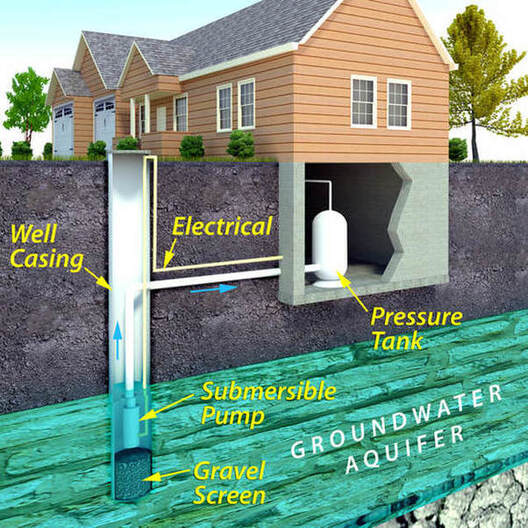
Chilliwack Water Well Efficiency
With all water well drilling method in the Upper Fraser Valley, the permeability of the formation around the borehole is reduced.
For example, with the cable-tool method, compaction and clay-smearing occurs.
With the wet-rotary drilling method, fluid in-filtrates the aquifer and when reverse circulation is used, water that is loaded down with fines can often obstruct the formation as a vacuum effect occurs around the drilling bit.
Chilliwack Water Well Development
Water well development is demanding & crucial for durable well completion to maximize the efficiency of a drilled well by re-rehabilitating the aquifer after the disruption of the well drilling and installation process.
Fine-particles surrounding a well-screen must be removed from the area to increase the permeability of the aquifer, with the use of air and our unique surge methods to greatly enhance our water well development procedures!
Water Well Screen Design & Selection
Chilliwack Well Drilling experts know the importance of water well-screen design, careful selection of a well screen is, without doubt, the most important consideration when constructing a long lasting and efficient water well.
A properly selected well screen is designed to serve two basic purposes: to allow the unobstructed entry of clean water free from sediment into the well, and to permit a maximum flow to the formation for water well development procedures.
Call Chilliwack Well Drilling today or request an online well drilling estimate for the cost to drill a well in Chilliwack.
With all water well drilling method in the Upper Fraser Valley, the permeability of the formation around the borehole is reduced.
For example, with the cable-tool method, compaction and clay-smearing occurs.
With the wet-rotary drilling method, fluid in-filtrates the aquifer and when reverse circulation is used, water that is loaded down with fines can often obstruct the formation as a vacuum effect occurs around the drilling bit.
Chilliwack Water Well Development
Water well development is demanding & crucial for durable well completion to maximize the efficiency of a drilled well by re-rehabilitating the aquifer after the disruption of the well drilling and installation process.
Fine-particles surrounding a well-screen must be removed from the area to increase the permeability of the aquifer, with the use of air and our unique surge methods to greatly enhance our water well development procedures!
Water Well Screen Design & Selection
Chilliwack Well Drilling experts know the importance of water well-screen design, careful selection of a well screen is, without doubt, the most important consideration when constructing a long lasting and efficient water well.
A properly selected well screen is designed to serve two basic purposes: to allow the unobstructed entry of clean water free from sediment into the well, and to permit a maximum flow to the formation for water well development procedures.
Call Chilliwack Well Drilling today or request an online well drilling estimate for the cost to drill a well in Chilliwack.
Chilliwack
Water Well Report Database
British Columbia Ministry of Environment
WELLS BC Database Chilliwack
WELLS BC Database Chilliwack
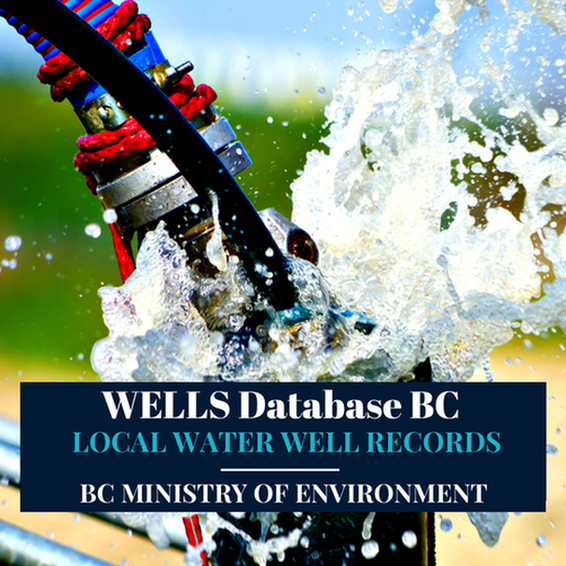
Well Drilling Regulations for Chilliwack
BC Ministry of Environment WELLS Database for Upper Fraser Valley, including Chilliwack, Bridal Falls, Chilliwack River Valley, Columbia Valley, Cultus Lake, Chilliwack Mountain, Fairfield Island, Greendale, Kent, Little Mountain, Popkum, Promontory Heights, Rosedale, Ryder Lake, Sardis, Sumas Mountain, Vedder Crossing, Yarrow, Hope & Merritt.
WELLS Database Chilliwack, well drilling regulations and Chilliwack Groundwater protection is regularly updated and managed by the British Columbia Ministry of Environment.
The provincial government's iMapBC for Chilliwack is an important online portal to a wealth of open government data for the Upper Fraser Valley.
A valuable water resource, WELLS Database is a free online system available for public use, it you need any help, please feel free to contact our office, we are available to help or answer questions.
Along with the Water Well Regulations for Chilliwack and the Water Well Search Tool, you'll find the provincial land use requirements, setbacks, Fraser Health Authority, BC Water Rights Database, and other important water resources and reports to download.
Chilliwack Well Drilling provides local Well Drilling Regulations for the Upper Fraser Valley, Canadian Drinking Water Guidelines, the BC WELLS Database, and the BC Water Atlas for Chilliwack and the Upper Fraser Valley.
Water Well Regulations Chilliwack
Private Well Owners Chilliwack
BC Ministry of Environment WELLS Database for Upper Fraser Valley, including Chilliwack, Bridal Falls, Chilliwack River Valley, Columbia Valley, Cultus Lake, Chilliwack Mountain, Fairfield Island, Greendale, Kent, Little Mountain, Popkum, Promontory Heights, Rosedale, Ryder Lake, Sardis, Sumas Mountain, Vedder Crossing, Yarrow, Hope & Merritt.
WELLS Database Chilliwack, well drilling regulations and Chilliwack Groundwater protection is regularly updated and managed by the British Columbia Ministry of Environment.
The provincial government's iMapBC for Chilliwack is an important online portal to a wealth of open government data for the Upper Fraser Valley.
A valuable water resource, WELLS Database is a free online system available for public use, it you need any help, please feel free to contact our office, we are available to help or answer questions.
Along with the Water Well Regulations for Chilliwack and the Water Well Search Tool, you'll find the provincial land use requirements, setbacks, Fraser Health Authority, BC Water Rights Database, and other important water resources and reports to download.
Chilliwack Well Drilling provides local Well Drilling Regulations for the Upper Fraser Valley, Canadian Drinking Water Guidelines, the BC WELLS Database, and the BC Water Atlas for Chilliwack and the Upper Fraser Valley.
Water Well Regulations Chilliwack
Private Well Owners Chilliwack
CHILLIWACK WELL DRILLING SERVING
Chillwack Well Drilling Service: Agassiz | Bridal Falls | Chilliwack River Valley | Columbia Valley | Chilliwack Mountain | Cultus Lake | Fairfield Island | Greendale | Kent | Little Mountain | Popkum | Promontory Heights | Rosedale | Ryder Lake | Sumas Mountain | Yarrow | Sardis | Vedder Crossing | Hope
Chiliwack Well Drilling
Phone: 604-670-3033
Website: Chilliwack Well Drilling
Chilliwack Well Pump & Repair
Phone: 778-860-4220
Website: Chilliwack Well Pump Services
Chillwack Well Drilling Service: Agassiz | Bridal Falls | Chilliwack River Valley | Columbia Valley | Chilliwack Mountain | Cultus Lake | Fairfield Island | Greendale | Kent | Little Mountain | Popkum | Promontory Heights | Rosedale | Ryder Lake | Sumas Mountain | Yarrow | Sardis | Vedder Crossing | Hope
Chiliwack Well Drilling
Phone: 604-670-3033
Website: Chilliwack Well Drilling
Chilliwack Well Pump & Repair
Phone: 778-860-4220
Website: Chilliwack Well Pump Services
FRASER VALLEY WELL DRILLING SERVING
FRASER VALLEY WELL DRILLING: Abbotsford | Chilliwack | Yarrow | Sardis | Clearbrook | Harrison Lake | Hope | Ladner | Langley | Fort Langley | Aldergrove | Cloverdale | Maple Ridge | Whonnock | Ruskin | Pitt Meadows | Mission | Dewdney Area | Coquitlam | Burnaby | Surrey | Tsawwassen | White Rock | Squamish | Whistler | Pemberton
Fraser Valley Well Drilling & Pump Services
Phone: 604-670-3033
Visit Our Website: Fraser Valley Well Drilling
FRASER VALLEY WELL DRILLING: Abbotsford | Chilliwack | Yarrow | Sardis | Clearbrook | Harrison Lake | Hope | Ladner | Langley | Fort Langley | Aldergrove | Cloverdale | Maple Ridge | Whonnock | Ruskin | Pitt Meadows | Mission | Dewdney Area | Coquitlam | Burnaby | Surrey | Tsawwassen | White Rock | Squamish | Whistler | Pemberton
Fraser Valley Well Drilling & Pump Services
Phone: 604-670-3033
Visit Our Website: Fraser Valley Well Drilling
